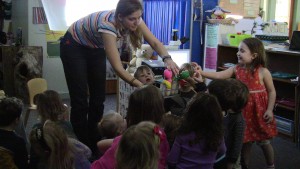Background:
In 2011, the Research Ambassador Program (RAP) recruited ten Fellows to come to the Evergreen State College campus for intensive training in communication of their research to non-traditional audiences. This allowed the Fellows to gain personalized guidance on disseminating their own research to established groups and create springboards for outreach in their home communities, and for the RAP staff to evaluate the efficacy of their activities.
Bio
Aurora is a native of Princeton, New Jersey. As an undergraduate, Aurora was introduced to the world of microbes by microbial ecologists, including her advisor, Dr. Jeanne Poindexter of Barnard College. Aurora’s research now focuses on microbes. At present, Aurora is a second year graduate student in Dr. Brenda Casper’s lab at the University of Pennsylvania where she works with the NSF PIRE (National Science Foundation Partnerships for International Research and Education) Mongolia Project. The goal of the project is to study the consequences of global climate change and land use pressures in the grasslands of northern Mongolia, which takes place at the Lake Hövsgöl International Long-Term Ecological Research site. The project investigates four experimental variables—warming, grazing, topography and water availability and related shifts in the structure and function of the soil microbial community. She uses pyrosequencing techniques to genetically characterize thousands of microbial species and to determine effects of microbial community shifts on carbon and nitrogen cycling. .
Components of her Fellowship
Communications Mentoring
RAP staff walked through Aurora’s draft PowerPoint presentations, offering pointers and clarifications, and adjustments to make the presentations appropriate for specific audiences that Aurora spoke to or wrote for, based on established contacts and experiences. RAP staff also helped Aurora distill a statement of her primary research interests.
United Churches of Olympia
In partnership with The United Churches of Olympia, Aurora offered a special presentation after Sunday services discussing the broad diversity of creatures present on the planet, and the curiosity we can all have regarding these creatures. RAP Staff have historically explored the interfaces of science and religion (see our Trees & Spirituality page), but this offered the opportunity for a visiting scientist to explore the interface of their own work. Aurora used a William Blake poem to begin her exploration and discussion:
To see a world in a grain of sand, And a heaven in a wild flower, Hold infinity in the palm of your hand, And eternity in an hourWashington Corrections Center for Women
In partnership with the Sustainable Prisons Project, Aurora spoke to 40 offenders and staff at the Washington Corrections Center for Women. Aurora described the spectrum of microbes that exist in the world, and the ecological roles that they play. She related her work to understand the ecological roles of microbes in Outer Mongolia, and how those roles may shift as climate change occurs.
The inmates demonstrated a high level of understanding of the ecology discussed as they asked in-depth conversations about climate change and probed an area of climate change research they had not considered before – the potential impacts, and impacts upon, the smallest of biota.
The Evergreen State College Campus Children’s Center
Although science curricula and standards are common for K-12 education, there is little attention given to introducing young 3 – 5 year olds to science or scientific concepts.
Aurora prepared a short (15-20 minute) PowerPoint of images of microbes to show to twelve 4-5 year olds at The Evergreen State College Campus Children’s Center. Once the children were introduced to the animals, they were offered the chance to look at various microbes with a microscope. Aurora successfully introduced children a variety of microbes, and to the idea that not all microbes cause infections and illness.
Science Seminar
Aurora also presented her work to a group of faculty, students and staff at The Evergreen State College.
Reflections and Lessons Learned
As a young scientist, Aurora is poised to use the skills gained as she shapes her research agenda and professional portfolio. RAP Staff observed tremendous growth in Aurora’s presentation skills in confidence in the three short days of her Fellowship, assuring us that the Fellowship model can provide valuable training in short periods.
Aurora’s research area presented a new challenge in that her primary focus, microbes, are not visible to the naked eye. With Aurora, we explored means of communicating phenomena that are relatively invisible, and areas of climate change science which are not as obvious or high-profile. Aurora’s presentations demonstrated that you can present ‘hidden’ science to non-traditional audiences.
Aftermath:
Communication after Aurora’ s return to her home institution included the following:
- RAP staff arranged to have the Provost at Evergreen send a formal letter of acknowledgment to her major professor and Chair so that she has an appropriate academic reward;
- RAP staff invited her to participate in an upcoming workshop on the RAP at the annual meeting of the Ecological Society of America
